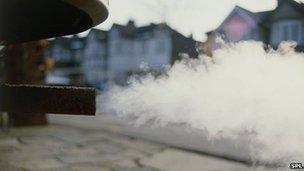Diesel exhausts do cause cancer, says WHO
- Published

The World Health Organization previously labelled diesel exhausts as probably carcinogenic
Exhaust fumes from diesel engines do cause cancer, a panel of experts working for the World Health Organization says.
It concluded that the exhausts <link> <caption>were definitely a cause of lung cancer</caption> <url href="http://www.iarc.fr/en/media-centre/iarcnews/2012/mono105-info.php" platform="highweb"/> </link> and may also cause tumours in the bladder.
It based the findings on research in high-risk workers such as miners, railway workers and truck drivers.
However, the panel said everyone should try to reduce their exposure to diesel exhaust fumes.
The International Agency for Research on Cancer, a part of the World Health Organization, had previously labelled diesel exhausts as probably carcinogenic to humans.
IARC has now labelled exhausts as a definite cause of cancer, although it does not compare how risky different carcinogens are. Diesel exhausts <link> <caption>are now in the same group</caption> <url href="http://monographs.iarc.fr/ENG/Classification/ClassificationsGroupOrder.pdf" platform="highweb"/> </link> as carcinogens ranging from wood chippings to plutonium and sunlight to alcohol.
It is thought people working in at-risk industries have about a 40% increased risk of developing lung cancer.
Dr Christopher Portier, who led the assessment, said: "The scientific evidence was compelling and the Working Group's conclusion was unanimous, diesel engine exhaust causes lung cancer in humans.
"Given the additional health impacts from diesel particulates, exposure to this mixture of chemicals should be reduced worldwide."
The impact on the wider population, which is exposed to diesel fumes at much lower levels and for shorter periods of time, is unknown.
Dr Kurt Straif, also from IARC, said: "For most of the carcinogens when there is high exposure the risk is higher, when there is lower exposure the risk is lower."
There have been considerable efforts to clean up diesel exhausts. Lower sulphur fuel and engines which burn the fuel more efficiently are now in use.
The UK Department of Health said: "We will carefully consider this report. Air pollutants are a significant public health concern, we are looking at this issue as part of our plans to improve public health."
Cancer Research UK said employers and workers should take appropriate action to minimise exposure to diesel fumes in the workplace.
But director of cancer information Dr Lesley Walker said the overall number of lung cancers caused by diesel fumes was "likely to be a fraction of those caused by smoking tobacco".